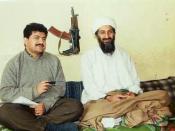Subject: Status Report on the censorship of radio play lists and talk program.
Overview: As the result of the terrorist attack on September 11, censorship of media has become one of the major concerns. The United States government is especially alarmed at Bin Laden's speech after U.S. British air strikes on October 7. The government decided to ask the press to "edit"ÃÂ or avoid Osama bin Laden speech in fear that he might be sending out secret message to his followers. Since the issue deals with national safety, no one seems to object it.
However, the government does not seem to be the only one that is getting alert at this censorship situation. According to Neil Strauss, not long after the attack, Clear Channel Communications, the Texas-based company that owns about 1,170 radio stations nationwide, made up a list of 150 songs and asked their stations to avoid playing them.
Their reason is that these songs would be insensitive to play at the time. Many stations, however, feel that their freedom of press is being violated. The jockeys say that it is their right to run the program their way. The conflict then starts because the company also thinks that they have the right to have input into the stations' broadcasting programs since they are providing the financial support.
Analysis: The radio stations feel that even though it might be insensitive to play some songs on the list right now, some of them could be as good in bringing people back together. They feel that they have right due to freedom of press, freedom of speech, and freedom of individual. As Neil Strauss writes in his article, since this list of songs included songs about flying and falling, if something else happens, he would probably have to remove all the songs about trains and whatever else. All the radio stations want is to please their listeners in order to maintain their ratings.
The corporate sponsors, however, feel that the stations should not broadcast any programs having anything to do with government or war in general basically because they do not want to offend anyone. They want to keep everyone happy and make some profit from their investment in these radio stations' business.
Obstacles: Other than wanting to keep their rating as high as possible, the radio stations think that it is their obligation to inform the public about the news of what is really going on. It is characteristic of democratic societies to make an effort to promote common understanding by allowing the views and ideas of their adversaries to be heard. The radio stations agree that access to the same information is required in order to resolve these differences, and the role of them as a mass media is to supply this information. They feel that only a clear and present danger can condense their freedom of expression.
In another point of view, the corporate sponsors also worry about their money. They feel that by presenting and giving all the information to the public, some one could be offended, and they would lose their investment. Their point of putting their money to support the stations is to make more money"ÃÂnot to give their money away. Moreover, they are certain that since they are one of the most important factors in the whole process, they should have a voice in what they want to stations to broadcast.
Prognosis: It is clear that the common interest of both parties is to keep everyone happy and to keep their ratings high. This conflict can be worked out as a win-win situation if the two parties willing to compromise. The corporate sponsors have to realize the fact that during this time people want to know the up-to-date and all that are going on as soon as possible. If the stations censor all the information, people will lose their interest, and their rating will go down. However, the radio stations might have to be more sensitive about the information or programs that they are broadcasting. They also have to respect the fact that without the corporate sponsors, they might not be able to broadcast at all. At the same time, the corporate sponsors might be better off by "suggesting"ÃÂ to the radio stations what they want to be done instead of telling them what to do. They too have to respect the freedom of press and freedom of individual.
Writing a contact that clearly states the agreement between the corporate sponsors and the radio stations about their right and freedom can be one of the ways for these two parties to compromise.





